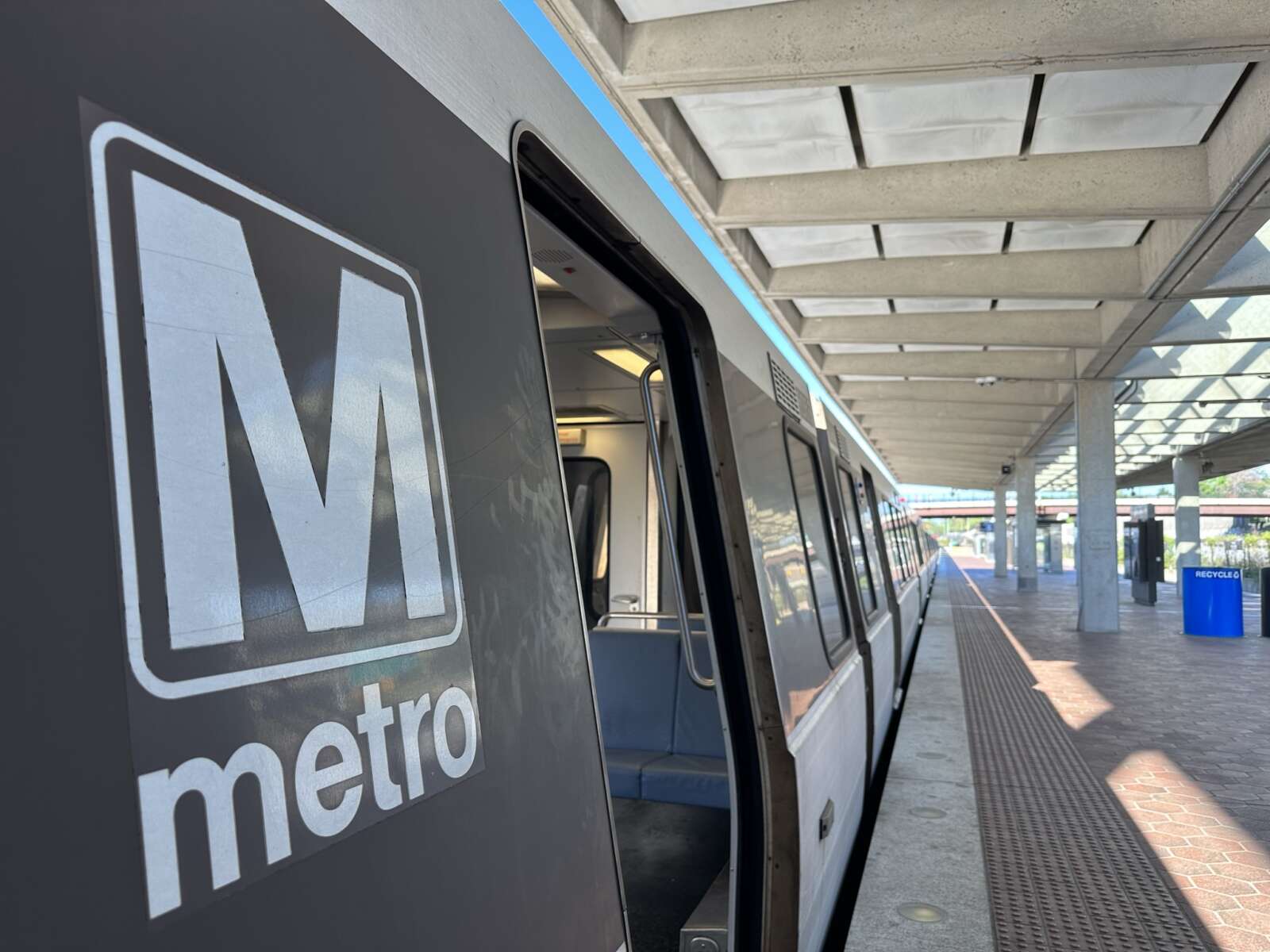
As Metro considers ways to address a looming $750 million shortfall and stave off changes to its operations, officials are requesting jurisdictions, including Virginia, review their options to help address the funding deficit that threatens thousands of jobs and various services.
Metro hopes policymakers in the commonwealth will consider adjusting the state law that sets a 3% cap on the growth of Virginia’s annual payment to the Washington Metropolitan Area Transit Authority. Dedicating more funding to Metro and overlooking the demands of other transportation projects, however, concerns some lawmakers and transportation leaders.
The shortfall
[Earlier this month], Metro officials made their case to Virginia leaders at the Commonwealth Transportation Board’s work session and joint House and Senate Transportation meeting in Arlington.
“We are obviously trying to avoid the cuts, but to do that, we need the cap [readjusted] and the certainty around funding,” said Randy Clarke, general manager and CEO of Metro, speaking at the Oct. 17 CTB work session.
As the agency faces a loss of COVID-19 relief funding at the end of the fiscal year, Metro officials said the reasons for the expected shortfall include revenue decreases since the COVID-19 pandemic, contractual commitments such as bargaining agreements and increased inflation costs.
In the meantime, Metro is focused on belt-tightening to avoid potential layoffs of about 5,000 employees, hiring freezes, and service cuts; the agency is also considering fare increases. Clarke said Metro is closely managing its operating expenses to help with carryover to the next fiscal year, and it could have a recurring fund of $50 million every year going forward for the next 10 years as part of an earlier initiative to create a savings plan.
“We’ve significantly reduced the …deficit for this year, but some of these are one-year solutions, but I think everyone again is just trying to figure out a more holistic path forward,” Clarke said.
On Oct. 19, Virginia Secretary of Transportation Shep Miller told the Mercury at the Governor’s Transportation Conference that region and state transportation leaders are considering Metro’s proposed shortfall. However, after speaking with committee members, it’s unclear which body will take up Metro’s request.
At the Oct. 17 work session, Miller said Metro is an important system and has been on “good footing” compared to previous years marked by management issues. Still, the agreement between the jurisdictions, and the millions of dollars each is being asked to contribute to Metro, is a difficult matter.
“Whether the number is 750 or whether it’s 500, or whether it’s 350, on an annual basis, [it] is going to be a choker for the folks that got to come up with the money,” Miller said.
3% cap
Clarke said Metro needs some clarity on what funding adjustments Virginia can make to address the expected deficit, ideally by December. To help address the $750 million shortfall, Metro officials are proposing Maryland and Virginia adjust their 3% cap on the growth of their annual payments to WMATA, which would require a one-time adjustment for fiscal year 2025.
However, in Virginia, any changes to the state law could be a lengthy process.
“Virginia, Maryland and the District all have different calendars and the timing and some of the things that the general manager and his team will have to enact or put in place [makes for] a very complicated situation that we’ll have to work through,” said Paul Smedberg, chair of the Metro Board of Directors.
In 2018, Virginia, Maryland, Washington D.C., and WMATA partnered to address the agency’s financial issues operating transit services in the D.C. metropolitan area, primarily in Northern Virginia. The three jurisdictions established a dedicated funding source for the transit agency to help address any maintenance issues. The Virginia General Assembly then created the WMATA Capital Fund to uphold its portion of the agreement.
The state appropriates the funds to the Northern Virginia Transportation Commission, transferring them to WMATA for capital projects and operating assistance. In 2022, Virginia contributed $200.8 million to WMATA, according to the Department of Rail and Public Transportation.
Under the state law, if WMATA’s budget increases the commonwealth’s payments by more than 3% in any given year, state code directs the Commonwealth Transportation Board to withhold 35% of funding for capital and operating assistance.
However, at the beginning of the pandemic in 2020, Metro provided jurisdictions including Virginia a credit of $196 million. Metro provided the credit because jurisdictions’ funding was unclear until they received the second round of federal pandemic relief money.
Clarke said if the credit were compounded, it would be worth $690 million to date.
“You could actually argue that without the credit, we would actually have a more or less balanced budget this year,” Clarke said. “That doesn’t mean we wouldn’t have a next year of significant funding issue, but that’s how large that credit is, especially when you add in the compounding.”
Virginia legislators’ funding concerns
Lawmakers at the Oct. 19 Joint House and Senate Transportation Committee meeting expressed concern about the potential impacts of the shortfall, while others didn’t want their colleagues to lose sight of other priorities such as road and multimodal projects in the commonwealth.
Del. Terry Austin, R-Botetourt, said lawmakers must fund and maintain the rest of Virginia’s transportation network.
“We have to acknowledge the needs of Metro and the needs of the transportation surface movers in this region of the state, nor can we allow [it] to take away from all the needs of all the rest of the state,” Austin said. “We have a problem with revenue. Our transportation needs far exceed our ability and this is a huge need.”
Del. Vivian Watts, D-Fairfax, added that when the agreement was created between the jurisdictions it was because of trust issues with the transit agency and its management of operations. However, she applauded Clark’s work since joining the agency last July.
Still, Watts said, “We cannot, as we move forward, take all of the importance of Metro and say that it overrides this region’s total transportation needs.”
Sens. Barbara Favola, D-Arlington, and Jennifer Boysko, D-Fairfax, said Metro has had a major impact on the environment and business communities in their districts. According to Metro, 70% of jobs and 60% of the region’s population are within a half-mile of a transit stop.
Sen. Dave Marsden, D-Fairfax, said policymakers must work as “diligently” as possible to restore things for Metro next fiscal year.
“When you start talking about the 3% cap not being adjusted, when you start talking about the possible layoffs, possible reductions in budget that require reduced services because you do have to be a balanced budget, you’re talking about the beginning of the death spiral for an agency that is critical to this commonwealth’s economy, [and] critical to Northern Virginia because COVID has changed everything,” Marsden said.
On Oct. 17, Miller told Metro officials he was also concerned with the agency’s overdue safety needs, totaling approximately $4.5 billion.
Clarke said Metro’s structures, tracks and power cabling are in good condition, but the agency is concerned that using its capital for operations will delay the roll out of the 8000 series rail cars and keep the 3000 series railcars in service longer. Clarke said the 3000 series rail cars have already reached the maximum life of a railcar, around 35-40 years.
Clarke said he doesn’t believe the agency will ever have zero dollars worth of overdue safety needs because Metro is constantly working on its safety plan.
Still, he said, “We got to keep that number low because that number means a state of good repair, which means reliability, which means, ultimately, a safe system.”
This article was reported and written by the Virginia Mercury, and has been reprinted with permission.
Recent Stories

We’re about a month out from summer. That means you’ve still got time for spring cleaning!
Lexi Grant, an operations manager at Well-Paid Maids, shared her go-to spring cleaning tips with WTOP News. Step one? Declutter. Get rid of items you don’t use, find space for items that need a home and organize those areas.
Then, it’s time to dust. Lexi starts with high-touch surface areas (think: refrigerator, dishwasher, counters, microwave). One area she sees often neglected is the bedroom — and it makes sense. Heavy furniture is difficult to move around, but it’s important to really get in there so dust doesn’t affect your sleep.

FREE Leadership Sessions will be conducted at the George Mason University –Arlington Campus for High School Latinas. The program runs from Monday 7/15 through Friday 7/19 from 10:00AM to 3:00PM EST each day (1-week).
Las sesiones de liderazgo GRATUITAS se llevarán a cabo en el campus de George Mason University – Arlington para latinas de secundaria. El programa se desarrollará desde el lunes 15 de julio hasta el viernes 19 de julio, de 10:00 a.m. a 3:00 p.m. EST cada día (1 semana).
Our goal is to equip students with the fundamentals of self-promotion and guide them in shaping their personal brand for future success. What sets this program apart is its integration of self-awareness activities and mentorship by seasoned professionals.
Sessions begin with a thorough assessment of leadership dynamics on July 15th, participants delve into the intricacies of personal branding and etiquette on July 16th, followed by practical guidance on crafting compelling LinkedIn profiles and resumes on July 17th. July 18th emphasizes the art of storytelling through personal statements, while July 19th culminates in portfolio presentations, allowing participants to showcase their newfound skills. The program concludes on July 20th with a memorable graduation ceremony, celebrating the accomplishments of the ELITE Academy’s graduates and their journey towards leadership excellence.
Reclaim Your Health Holistically! Vienna, VA
This live local wellness workshop offers everyone a great occasion to discover how to implement natural safe effective solutions for all ages and stages. It is also a great opportunity to continue to celebrate the mamas in your life during
Air Layering: Propagating Difficult to Root Plants
Air Layering Workshop: Propagating Difficult-to-Root Plants
Sunday, May 19, 2024
1:00-3:00pm







